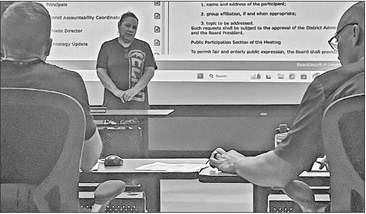Colby K-12 tables policy on Title IX
By Nathaniel Underwood
After receiving information and a recommendation from their attorney Dean Dietrich and hearing comments from concerned members of the public, the Colby School board decided to table a motion to approve or disapprove the second reading of the proposed Title IX policy at their regular monthly meeting Monday night. Due to ongoing litigation in the federal courts that have reached a variety of decisions, the board moved to adopt a wait-and-see approach, given the unknowns surrounding the status and enforcement of the new Title IX regulations.
The board initially approved the first reading of the new Title IX policy at their July meeting under unanimous decision. They also unanimously chose to table the second reading’s approval or disapproval on Monday evening, which will push the final decision on whether or not to implement the new policies to a future date.
On Aug. 1, the new Title IX regulations put forth by the federal Department of Education were set to go into place. The new regulations broadened the scope of what was previously covered under the prior Title IX regulations passed in 2020, expanding the rules regarding sex discrimination and sexbased harassment. These rules, according to a statement given by the Department of Education, clarify the protection against discrimination based on sex stereotypes, sexual ori-
See TABLED/ Page 6 Tabled
Continued from page 1
entation, gender identity, and sex characteristics.
However, numerous lawsuits have been filed across the country, creating injunctions in federal circuit courts that have blocked the new Title IX rules from going into effect in 26 states. While Wisconsin is not one of those states, Dietrich, the school’s district’s attorney, cautioned the board about approving the new policy at this time.
“There have been approximately 15 lawsuits filed throughout the country about some of the changes that are proposed as part of the new Title IX regulations,” Dietrich said at the school board meeting. “Those states have had a variety of court decisions, many of which have stopped the enforcement of those regulations against school districts in that state.”
“Wisconsin is not one of those states where a lawsuit has been filed,” he continued. “However, a number of school districts in the state of Wisconsin have been subject to court rulings from other states, particularly from Kansas, because members of the school board or residents of that district belong to a particular organization that has brought suit to block the implementation of these regulations.”
The organization that Dietrich made reference to is Moms for Liberty, a nation-wide group that describe themselves as dedicated to defending parental rights at all levels of government, according to their website.
They were one party involved in recent lawsuits regarding the implementation of the new Title IX policies, including a ruling by District Judge John Broomes of Kansas that created an injunction that stops the U.S. Department of Education from being able to enforce the new Title IX policies in Kansas, Utah, Wyoming and Alaska, as well as any individual schools that have students who have a parent in the Moms for Liberty organization across the country.
According to the Southeastern Legal Foundation, which represents the group in these court cases, the organizations argue that the new Title IX policies violate students’ First Amendment rights by compelling them to affirm the gender identity of other students, goes against the Tenth Amendment, which speaks to the states’ rights, and will not protect students with sex-separate private spaces like bathrooms and locker rooms.
Many of the community members who attended Monday’s board meeting shared a similar sentiment as the groups who have filed lawsuits against the new Title IX regulations, as concerns over the handling of such private spaces seemed to be of primary concern. Several of those gathered for the meeting also identified themselves to be part of the Moms for Liberty group.
Other members of the community expressed that, while they were happy to see the issue tabled for the evening, they suggested the school take it a step further and join further litigation against the new Title IX policy. The board did not discuss such actions at this time.
It was also noted by Dietrich that a decision from the United States Supreme Court last Friday additionally muddies the waters. The Department of Education had asked that the issue be separated into two separate parts, wanting to be able to enforce most of the new rule while leaving out the disputed parts regarding sex-separate spaces and other transgender issues while it goes through litigation.
While not a final decision, the move from the Supreme Court effectively blocked the enforcement of the entirety of the new Title IX regulations by the Department of Education, deciding that the two parts were too intertwined to be ruled on separately.
“My recommendation to the board is that you pass a motion tabling this until we get final rulings on the appropriateness of the language that is being challenged in this regulation,” Dietrich said.
“Now, I need to warn the board that if you take that action, that does not limit potential liability to the board if the school district acts contrary to law and contrary to court rulings as it relates to protections under the definition of sex discrimination,” Dietrich added. “There are several federal court decisions covering the state of Wisconsin that have held that a school district is to honor the request of the student for the use of a restroom based upon their stated desire.”
The court case that Dietrich alluded to is a ruling by the Seventh Circuit Court of Appeals, which in a 2017 case involving the Kenosha Unified School District, it was ruled that the district could not continue to prevent a transgender student from using a bathroom according to their gender identity and to not use their preferred pronouns. The ruling in this case serves as precedent that the school could be held liable for similar actions, regardless of if the new Title IX regulations were to be implemented or not.
“Each case is to be treated on a case by case basis and there are a myriad different accommodations that can be made to satisfy the request of the student and at the same time maintain appropriate compliance with the federal law and regulations,” Dietrich said.
“There is a process that would take place in any of these situations and we would work through, with family members, with any student who had raised this concern,” superintendent Patrick Galligan added. “So it does not automatically mean that a student would just walk into a restroom facility or something else. There would be a process, we would engage with the family as a school, with every single case that we would have and we would contact Dean as well.”
After the board moved to table the motion for a later date, several members of the community asked that the board communicate to members of the district when the issue would be brought before the board again. Galligan said that he would make sure that it would be communicated through a number of different channels to inform the public of when the board would be reconsidering the matter.
Referendum questions approved
The board unanimously approved motions to put forth two referendum questions on the November ballot for voters in the Colby School District.
The first question, which will be asking for a $17.8 million bond, will target primary infrastructure issues that need to be resolved as well as the creation of new secure entrances and renovations to modernize classrooms and other learning spaces. The second question, meanwhile, which will be looking for authorization for a $7.7 million bond, will be focused on the construction of an addition onto the elementary school for the purposes of creating new art and music spaces and making room for a reconfiguration of grade levels, which would allow fourth grade back into the elementary school and eighth grade back into the middle school.



